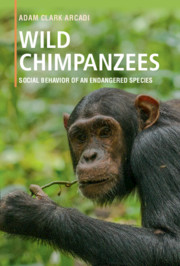Book contents
- Wild Chimpanzees
- Wild Chimpanzees
- Copyright page
- Dedication
- Contents
- Preface
- 1 Primates, Apes, and the Study of Chimpanzee Social Behavior
- 2 Seven Long-Term Field Studies
- 3 Chimpanzee Fission–Fusion Social Organization and Its Conservation Implications
- 4 Sex Differences in Ranging and Association Patterns
- 5 Female Social Relationships
- 6 Male Social Relationships
- 7 Sexual Behavior: Conflicting Strategies of Males and Females
- 8 Coalitionary Lethal Aggression between and within Communities
- 9 Hunting, Eating, and Sharing Meat
- 10 Communication: The Form and Content of Signals
- 11 Community Differences in Grooming Postures and Tool Use: Innovation, Social Learning, and the Question of “Culture”
- Epilogue
- Appendix: Field Methods for Studying Wild Chimpanzees
- End Notes
- References
- Index
- Plate Section (PDF Only)
Preface
Published online by Cambridge University Press: 01 June 2018
- Wild Chimpanzees
- Wild Chimpanzees
- Copyright page
- Dedication
- Contents
- Preface
- 1 Primates, Apes, and the Study of Chimpanzee Social Behavior
- 2 Seven Long-Term Field Studies
- 3 Chimpanzee Fission–Fusion Social Organization and Its Conservation Implications
- 4 Sex Differences in Ranging and Association Patterns
- 5 Female Social Relationships
- 6 Male Social Relationships
- 7 Sexual Behavior: Conflicting Strategies of Males and Females
- 8 Coalitionary Lethal Aggression between and within Communities
- 9 Hunting, Eating, and Sharing Meat
- 10 Communication: The Form and Content of Signals
- 11 Community Differences in Grooming Postures and Tool Use: Innovation, Social Learning, and the Question of “Culture”
- Epilogue
- Appendix: Field Methods for Studying Wild Chimpanzees
- End Notes
- References
- Index
- Plate Section (PDF Only)
Summary
When the renowned fossil hunter Louis Leakey arranged for Jane Goodall to begin her field study of wild chimpanzees in East Africa, he hoped that her observations would shed light on the evolution of human ancestors. In the nearly six decades since, chimpanzees have become the most studied nonhuman mammal species in the wild and our primary model for thinking about how the last common ancestor of chimpanzees and humans may have behaved. The list of intriguing discoveries about these African apes is long and still growing: wild chimpanzees are prodigious tool users, they form and manipulate coalitions to achieve social status, they hunt in groups for large mammal prey, they occasionally kill their neighbors, and they exhibit persistent group-level differences that are reminiscent of human cultural variation, to name a few of their most notable features. Revelations such as these offer important clues about the early stages of an evolutionary voyage that would lead to modern Homo sapiens, the most intelligent and socially complex animal in the history of life.
How sobering, then, to contemplate that these intelligent and socially complex apes, our closest relatives in the animal kingdom, are poised for extinction in their natural habitat. Chimpanzees form large, mixed-sex groups, or “communities,” that aggressively defend extensive feeding territories where they find the ripe fruits that constitute the mainstay of their diet. When they reach sexual maturity, females typically disperse from these groups to breed in neighboring communities. In order for genetically viable populations to thrive, therefore, chimpanzees require intact forest areas that encompass multiple contiguous territories between which females can move. Habitat loss and fragmentation inevitably have devastating effects on chimpanzee populations, reducing food supplies, constricting mating opportunities, and forcing lethally antagonistic groups either into close contact with one another or into fringe habitats where they have access to only remnant patches of forest. Since the equatorial African rain forests on which chimpanzees rely continue to be harvested for timber and cleared for agriculture, their survival prospects are truly grim.
Long-term research projects play a key role in chimpanzee conservation efforts. Protecting chimpanzee populations relies partly on having detailed and comprehensive information about their social behavior, their ecological requirements, and the limits of their social and ecological flexibility. Since chimpanzees are long-lived animals and tropical forest habitats vary greatly and change over time, this necessitates the establishment and maintenance of decades-long field studies.
- Type
- Chapter
- Information
- Wild ChimpanzeesSocial Behavior of an Endangered Species, pp. ix - xivPublisher: Cambridge University PressPrint publication year: 2018



